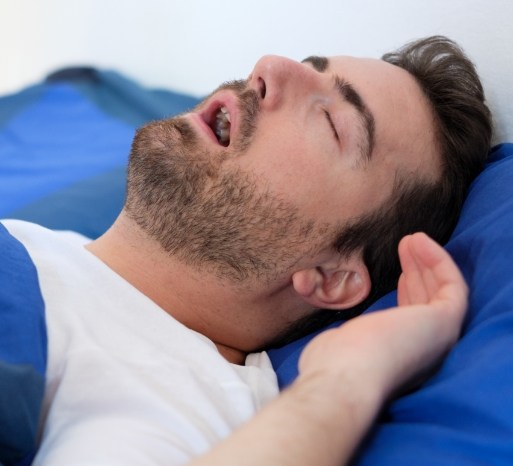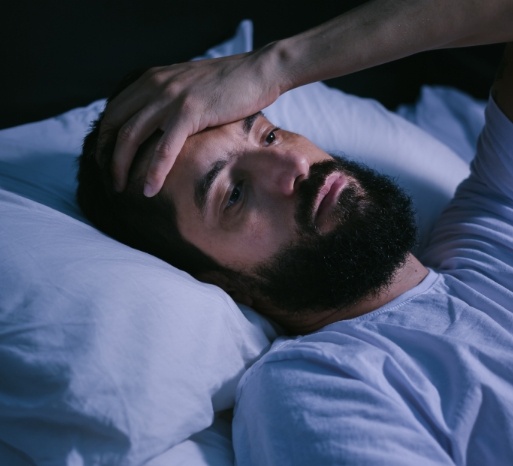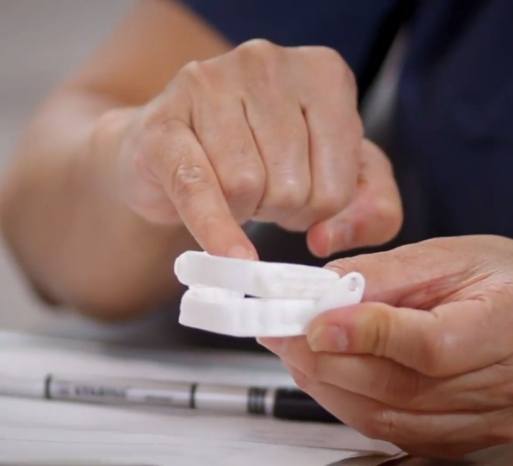Sleep Apnea in Itasca, IL
You Deserve a Great Nights Sleep
Your sleep should be peaceful and rejuvenating—not interrupted by snoring or discomfort. If your nights consist of waking up tired, using earplugs, or hearing stories of your loved one leaving the bed, your rest is being compromised. And if you’ve heard about gasping or choking, it might point to sleep apnea.
At Hamilton Lakes Dentistry, we’re committed to helping you find the restful nights you deserve with our specialized sleep apnea treatments right here in Itasca, IL.
Don’t let another night go by without taking action. Call us today to schedule your consultation.

Why Choose Hamilton Lakes Dentistry for Sleep Apnea Treatment?

What is Sleep Apnea?
Sleep apnea derives from the Greek word meaning “without breath.” It is a serious sleep disorder in which breathing repeatedly stops and starts while the patient is asleep. The blockage of the upper airway is what usually causes it, and it results in very loud snoring, gasping for breath, and choking. Unfortunately, this doesn’t only affect the patient. It also results in partners feeling sleepy and fatigued the next day. Sleep apnea has also been linked to cardiovascular disease, cancer, cognitive impairment, and high blood pressure. The great news is Dr. Kathy French, Dr. Alexa French & Dr. Kate Conti at Hamilton Lakes Dentistry have effective treatments.
Common Sleep Apnea Symptoms Include the Following:


Sleep Apnea Treatment
The dentists at Hamilton Lakes Dentistry treat sleep apnea with a removable appliance similar to a mouthpiece that assists in repositioning your jaw and stabilizing the tongue. As a result, your mouth can normally open and close so you will experience unobstructed airflow through your mouth. This will provide instant sleep apnea symptom relief. Our treatment is much less invasive than the CPAP (continuous positive airway pressure) device, which is considered to be the standard for treating sleep apnea. Our treatment is great for someone who cannot tolerate the CPAP device or who suffers from mild sleep apnea. The oral appliance is user-friendly and will require almost no change to your daily routine.
Sleep Apnea Frequently Asked Questions
Knowing whether you have sleep apnea or not isn’t exactly easy. Even if you discover you have this common condition, you likely feel out of the loop when it comes to treatment and living life with a sleep disorder. To offer greater peace of mind on the topic, our team of experts is here to deliver the answers you need to feel more at ease when dealing with sleep apnea.
Does snoring mean I suffer from sleep apnea?
What are common indications of sleep apnea?
Long pauses between breaths and loud snoring during sleep are the most common signs of sleep apnea.
If I have sleep apnea, do I need to sleep with a machine?
Can I Diagnose Sleep Apnea on My Own?
However, it can be helpful to monitor the quality of your sleep. By using a sleep journal or wearing a smart watch, you can identify patterns in your nightly rest. The data can help both you and your medical team to understand what is causing your symptoms and the best way to bring about improvements.
Will My Sleep Apnea Go Away If I Lose Weight?
However, some people do not see improvements when they lose weight. This can happen if the sleep apnea is caused by anatomical issues that are unrelated to weight, such as a deviated septum or narrow palate.
How Soon After Starting Sleep Apnea Treatment Will I Notice Improvement?
Some time after you start treatment, you may be advised to undergo a second sleep study. This will confirm whether or not your therapy is working.
Who Is Most at Risk for Sleep Apnea?
Anyone, regardless of their age, gender, lifestyle, or body composition, could develop obstructive sleep apnea. However, some groups are more at-risk than others, including:
✔Biological men
✔Post-menopausal women
✔Individuals who are obese
✔Pregnant women
✔People with an untreated tongue tie
